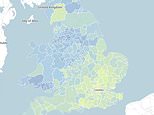
The neighbourhoods where house prices are rising quickest can today be named.
Prices have doubled in a dozen suburbs across England and Wales over the last seven years, Daily Mail and This is Money analysis shows.
Old Trafford, Manchester, has witnessed the biggest rise, in a trend experts think is down to the booming economy in the city nicknamed the ‘Dubai of the North’.
There, prices have leapt 162% – from an average of £114,000 in the year to July 2019 to around £300,000 in July just gone.
Using Land Registry sales figures, we tracked house sales in all 7,000 middle layer super output areas (MSOAs) – tiny geographical areas typically home to around 10,000 residents.
You can zoom into street level on our interactive map below to see how the market has changed in your neighbourhood.
Behind Trafford, the Highfield and Lowfield pocket of Sheffield recorded the second largest boom.
In that inner-city suburb, house prices rose 145%, from £75,000 to over £185,000.
Another part of Manchester – Pendleton in Salford – ranked third (135.4%).
Rounding out the top five was the Ravenscliffe area of Bradford (123.1%) and Elswick South neighbourhood in Newcastle-upon-Tyne (118.3%)
Tom Bill, head of residential research at Knight Frank, said: ‘The biggest factor that has influenced house price growth in recent years is affordability.
‘Relatively more affordable parts of the country have seen house prices increase to a greater extent, which means the regions are narrowing the gap with London.
‘Despite this process being accelerated during the pandemic, it’s not a gap we see closing any time soon.
‘Differences between neighbouring areas are caused by a variety of factors, including schools, proximity to transport infrastructure and access to open spaces.
‘I would expect regional areas of the UK to keep outperforming London over the next several years, as the economy continues to diversify geographically and commuters adapt to life after the pandemic.’
Trafford, in particular, has been labelled an ‘investment hotspot’ by property experts.
CityRise, a UK-based property investment agency, said its rapid growth was mainly driven by working professionals flocking to the area because of the ‘endless opportunities’.
In a blog post, it said: ‘With numerous amenities within walking distance, Trafford is becoming an increasingly attractive option for those who prefer not to live in the city centre.
‘Its convenient location on the metro line offers easy access to Manchester city centre, Trafford Centre, and Manchester Airport.
‘Due to the ongoing regeneration projects, and the rise in demand in Trafford, investing here now is a smart choice for investors aiming to maximise capital growth potential in the coming years.
‘Manchester’s property market benefits from the continuous infrastructure developments and regeneration that enhance the city’s appeal and drive property prices upward.’
Manchester United play just down the road at Old Trafford and a new, 100,000-seater stadium for The Red Devils is expected to be built by 2030.
Manchester was this summer recognised as having the fastest-growing economy in the UK by consulting giant EY’s forecasting team.
Andy Burnham, mayor of Greater Manchester, said the rapid growth meant the city stood ‘on the cusp of what I believe could be our best decade since the Victorian-era.’
Average UK house prices increased by 2.8% to £270,000, in the 12 months to July 2025, according to the Office for National Statistics (ONS).
When broken down by local authority, Camden in north London logged the biggest total annual increase in the UK, jumping 6 per cent – or £53,365 – to just over £920,000.
Bromley saw the biggest percentage increase, however, as prices rose 8 per cent to £538,904.
But it was not a city-wide trend. Of the 32 London boroughs and the City of London, 20 saw an increase in house prices, but 13 lost out.
Kensington and Chelsea, home to some of the most exclusive properties in the UK, saw properties fall by £34,041, or 3 per cent.
But the average home in the exclusive west London borough still stands at just over £1.3million.
Westminster homes also plunged 5 per cent, shedding £46,873 off their value, with the average property priced at £976,519.
James Stuart-Mogg, head of sales at John D Wood & Co. in Kensington, said slumps may be down to Labour’s stamp duty hike for second home buyers.
Chancellor Rachel Reeves announced anyone buying an additional property will have to pay a 5 per cent surcharge, up from 3 per cent before last autumn’s Budget.
House sales in MSOA neighbourhoods can vary drastically month by month, so our analysis aggregates them annually to July of this year.
#Revealed #neighbourhoods #house #prices #rising #quickest #including #soared #years















